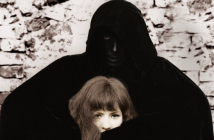White God (2014)
Cast: Zsófia Psotta, Sándor Zsótér, Lili Horváth
Director: Kornél Mundruczó
Country: Hungary
Genre: Drama
Official Website: Here
Editor’s Note: White God opens in limited release on March 27.
It was W.C. Fields that famously said, “never work with animals or children.” I get it, both kids and animals are largely uncontrollable, erratic, and somehow always hungry. They can be a distraction and often end up being one of the most talked about elements of a film. Jean Dujardin may have won the Oscar for The Artist, but I’m pretty sure more people were talking about Uggie the dog when all ways said and done. The problem is that adults are expected to be good and children and animals don’t really carry that burden. So when they are good, audiences eat it up. In White God, co-writer and director Kornél Mundruczó gives a strong middle finger to Fields and just has the girl and the dog be the story, and it really works.
White God is for an audience that craves to be kept on its toes. Mundruczó feels no need to explain things, he seems to take pleasure in making you work it out for yourself. As the film begins, it has all of the trappings of a post-apocalyptic feature. Our lead pedals towards us on a bike, seemingly without fear as a pack of dogs comes barreling down the street towards both her and us. Then, just like that, we are out of the mayhem, calmly with a girl and her dog. Sure, it’s not exactly groundbreaking to offer the viewer a shot of where the film is headed only to go back to the beginning, but Mundruczó’s lack of explanation is delightful. Smashing us from fear-inducing hysteria to mundanity is part of the message. For as a society, aren’t we always just that close to upheaval.
The trappings of genre are tools that Mundruczó uses to paint a fuller picture, and his deft ability to seamlessly hop between them with no fanfare would be a wonder to watch if it weren’t so subtle.
Mundruczó’s skill with transitions carries throughout the film’s entirety. In the way he has built his film, it is a towering behemoth of intersecting genres. As much as it is a story of friendship and loss it is also that of class stratification. It revels in the tropes of family dysfunction, horror, slasher, revenge, and, as previously mentioned, post-acolyptic fare. But despite these many inspirations, it never feels scattered. There is a clear vision throughout and this always remains Mundruczó’s film. He blends the styles with an effortless finesse, managing to both celebrate the genre and not allow it to define the story and film itself. The trappings of genre are tools that Mundruczó uses to paint a fuller picture, and his deft ability to seamlessly hop between them with no fanfare would be a wonder to watch if it weren’t so subtle.
 When Lili (the girl) and Hagen (the dog) are together, the film nearly skips along. The viewer is immediately drawn to this pairing, developing a quick closeness that speaks to the strength of the performances. We believe that Hagen is Lili’s dog and the strength of the bond between the two is inarguable. The other actors effectively fade into the background, for just as in the eyes of Lili and Hagen, no one else really matters. Unfortunately, as the two separate, the film loses a bit of its strength. Oddly enough, the power is not lost in Hagen’s story but in Lili’s. This does not speak to the skill of Zsófia Psotta as an actor, for she does as much as she can with the material, but a weakness of the script. Lili’s struggle with adolescence and life without her friend are merely trifles when compared to the adventures of Hagen. Even Mundruczó doesn’t seem all that interested in Lili’s story, as more and more time is devoted to the descent of Hagen. The greater importance of Lili as a character is somewhat lost as she is relegated to filler scenes. As the film concludes, Lili exists purely as Hagen’s saving grace and the film is somewhat lesser for that.
When Lili (the girl) and Hagen (the dog) are together, the film nearly skips along. The viewer is immediately drawn to this pairing, developing a quick closeness that speaks to the strength of the performances. We believe that Hagen is Lili’s dog and the strength of the bond between the two is inarguable. The other actors effectively fade into the background, for just as in the eyes of Lili and Hagen, no one else really matters. Unfortunately, as the two separate, the film loses a bit of its strength. Oddly enough, the power is not lost in Hagen’s story but in Lili’s. This does not speak to the skill of Zsófia Psotta as an actor, for she does as much as she can with the material, but a weakness of the script. Lili’s struggle with adolescence and life without her friend are merely trifles when compared to the adventures of Hagen. Even Mundruczó doesn’t seem all that interested in Lili’s story, as more and more time is devoted to the descent of Hagen. The greater importance of Lili as a character is somewhat lost as she is relegated to filler scenes. As the film concludes, Lili exists purely as Hagen’s saving grace and the film is somewhat lesser for that.
With that being said, the story of Hagen is one that is both emotionally exhausting and complex. The dogs are used beautifully by Mundruczó. As the film is shot, we come to understand the dogs even without words and are invested in their struggles. The way in which the dogs’ performances are captured is far more effective and skillful than those of the human actors. In Hagen’s story, Mundruczó finds his thesis and it is here that the film begs for deeper excavation. Serving as an allegory to racism and struggles of class, its telling is nuanced and delicate. The message emerges gradually and organically, avoiding the inherent heavy-handedness of political agendas.
…the greater story of Hagen, his destruction and path to redemption is executed better than many films featuring a human in that role.
For a movie that appears to be just about a girl and her dog, White God is surprisingly complex and nuanced. Director Kornél Mundruczó builds his film on the familiar trappings of many genres, allowing the topic covered to be both attainable, entertaining, and visually captivating. While sections of the film are slowly paced and the human element even comes off as superfluous, the greater story of Hagen, his destruction and path to redemption is executed better than many films featuring a human in that role. Mundruczó also slyly uses Hagen’s story to covey a deeper undercurrent of social exclusion, but he does so unobtrusively. White God plays like a dark and unrelenting Homeward Bound that has the brains and artistry to tell a far deeper story that never sacrifices its emotional strength.
White God plays like a dark and unrelenting Homeward Bound that has the brains and artistry to tell a far deeper story that never sacrifices its emotional strength.



